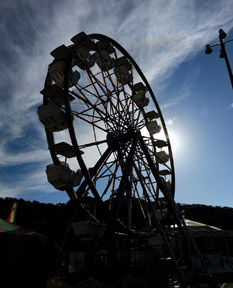The 33rd Agricultural District Board’s first obligation is to keep the fairgrounds open for business. For that reason, and because continued fiscal cuts have placed Bolado Park’s future in jeopardy, the fair board made a sensible decision by shifting primary rights for alcohol sales to the district’s nonprofit foundation.
Alcohol sales from the fair and San Benito County Saddle Horse Show & Rodeo provide significant revenue opportunities for the agricultural district and other participating organizations. Local fair board officials said it is difficult to make a precise estimate of a potential, overall revenue gain in giving first rights for those sales to the Heritage Foundation – which funnels money back to the district – but the Rotary Club alone has noted that it generates about $15,000 annually from its involvement in the Saddle Horse Show & Rodeo.
In these turbulent fiscal times, the fair board simply had to fully capitalize on those previously relinquished revenue streams while also examining other ideas to improve the district’s finances.
Last year, the state allocated $124,000 to the local district with a budget of around $400,000. This year, San Benito County is getting the last of its state money, $40,000 that – along with the help of another $26,000 pulled from reserves that are on pace to run out in three years – barely bumped the district into the black.
Those numbers should signal an alarm bell, and a fair board with relatively new membership has taken appropriate notice by underscoring a need to enhance current revenue streams and look to create new ones as well.
Fair officials have good reason to show concern.
County fairs across California have scrambled to stay open in recent years. Some have even closed in the wake of the recession and the state’s move to gradually cut all funds previously allocated to the agricultural districts overseeing those fairs.
Board members’ decision will prompt an unfortunate loss for the Rotary Club and Hollister Exchange Club, the other nonprofit absorbing the hit. But those two groups won’t be left completely out of the mix, as the agricultural district has offered to continue allowing those organizations’ involvement with vendor sales on some level. While the fair board’s decision might still sting for those groups’ members, they should strongly consider staying involved if it means any additional funds would go their ways.
They survived before and will survive without the alcohol sales. The same isn’t so clear for the county fair, prompting the change.
For the fair board, the decision regarding alcohol sales was a necessary step toward a more fiscally prudent direction. Board members have talked of other ways to increase revenue such as plans to hire a marketing professional to focus on promoting Bolado Park. It’s a smart idea, considering the facility attracts so many outside events throughout the year – such as the kennel club dog show, state gymkhana finals and the Northern California Bluegrass Festival – with so little promotion.
Still, fair board members have to think bolder and deeper. Bolado Park is a marketable treasure with a required use for recreation in perpetuity, and the community deserves to get the utmost possible gain out of the public facility. Every discussion should be on the table – including the feasibility and future of the nine-hole Bolado Park Golf Course leased out for $2,000 a month.
Considering that first obligation to keep the fairgrounds’ doors open, board members must explore every possible avenue to increase revenue while maintaining Bolado Park’s rich heritage as a keystone for the agriculture community.








